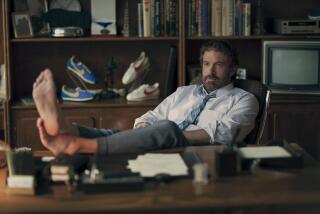Moore Fun and Commentary in ‘Big One’
Michael Moore is definitely a prankster, but calling him merry is stretching the point. Writer, director and protagonist of his own documentaries, a practiced performer who knows how to be amusing on camera, Moore is deadly serious behind the fun and games. He’s determined to make audiences ponder reality as well as laugh, and “The Big One,” his latest film, overcomes some odds to succeed in both areas.
Social concerns have always spurred Moore’s films, starting with his 1989 debut, “Roger & Me,” which showed the filmmaker doggedly attempting to confront General Motors Chairman Roger Smith about the closing of GM factories in Moore’s hometown of Flint, Mich. Moore never got quite the satisfaction from Smith he wanted, but his film won numerous awards and claims to be the highest-grossing, nonconcert documentary of all time.
For the record:
12:00 a.m. April 18, 1998 For the Record
Los Angeles Times Saturday April 18, 1998 Home Edition Calendar Part F Page 4 Entertainment Desk 1 inches; 30 words Type of Material: Correction
Movie rating--In the review of “The Big One,” which ran in Calendar April 10, the movie was listed as “unrated.” The movie has been given a rating of PG-13 for some strong language by the Motion Picture Assn. of America.
That success gave Moore the visibility and credibility to turn himself into a biting agent provocateur, someone who may look jolly and harmless but who mainlines indignation about what he considers the injustices of America’s political and economic system.
Much of the humor in “The Big One” comes from Moore’s tart comic observations, honed during numerous live appearances: HMOs are said to stand for “hand the money over,” and the last presidential election is called “the evil of two lessers.”
But Moore doesn’t just make jokes, he acts. When he discovers that Republican candidate Steve Forbes almost never blinks, he finds a doctor who’s shocked by that, and then asks Forbes campaign workers if their man is a space alien. And wanting to see if candidates would accept money from anywhere, he sent out checks in the name of organizations like Satan Worshippers for Dole, Abortionists for Buchanan and Pedophiles for Free Trade. More of them were cashed than you’d like to believe.
“The Big One” (the title comes from Moore’s tongue-in-cheek proposal for a new, more descriptive name for the United States) started in a decidedly haphazard fashion. Sent on a tour to promote his latest book, “Downsize This!,” Moore apparently decided pretty much on the spur of the moment to film his experiences on the road.
*
This seat-of-the-pants approach is reflected in the final film, whose ramshackle structure seems to include anything of interest Moore ran into, from an airport chat with Garrison Keillor to an improbable evening singing Bob Dylan with Cheap Trick’s Rick Nielsen in Rockford, Ill., Money magazine’s choice as the worst place to live in America.
Given that Moore’s subject is corporate downsizing, it’s a given that much of his energy in the film goes into investigating and criticizing a dichotomy he finds troubling: Despite making millions in profits, many corporations seem intent on throwing their employees out of work so they can contract for cheaper labor elsewhere.
That may sound like the dry stuff of newspaper think pieces, but nothing is dry when Moore gets hold of it. He leaves a tiny Post-it note for the CEO of massive Pillsbury asking why the Doughboy needs millions in corporate welfare, and then tries to present a company called Johnson Controls with a giant check made out for 80 cents, enough to magnanimously pay for the “first hour of work for the first Mexican worker” after the company completes a projected factory move south of the border.
Moore’s secret, aside from his refusal to ever turn the camera off even when he says he has, is that he is so determined and dangerously funny that if you’re in the frame with him when film is rolling, you’re in trouble. The only person who comes close to matching him in self-confidence and nerve is the one CEO who does agree to appear on camera, Nike’s Phil Knight, whose one-on-one with Moore provides a boggling climax to the filmmaker’s quixotic journey.
Sensitive and genuinely passionate as he is about injustice and the economic problems of America’s working class, Moore does not necessarily come off as a swell person in this film. An adroit self-promoter capable of playing an unpleasant practical joke on one of the escorts hired by his publisher, he doesn’t protest overly much when Cheap Trick’s Nielsen pegs him as potentially mean-spirited. But with an old-fashioned populist zeal that’s a throwback to the likes of Mother Jones and Big Bill Hayward, Moore’s gift is making us think about things we’d rather not think about, and making us chuckle while he’s doing it.
* Unrated. Times guidelines: adult subject matter.
‘The Big One’
Released by Miramax Films. Director Michael Moore. Producer Kathleen Glynn. Executive producers David Mortimer and Jeremy Gibson. Screenplay by Michael Moore. Cinematographers Brian Danitz and Chris Smith. Editor Meg Reticker. Music World Famous Blue Jays. Running time: 1 hour, 29 minutes.
* In limited release.
More to Read
Only good movies
Get the Indie Focus newsletter, Mark Olsen's weekly guide to the world of cinema.
You may occasionally receive promotional content from the Los Angeles Times.











